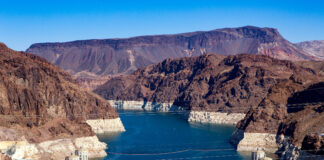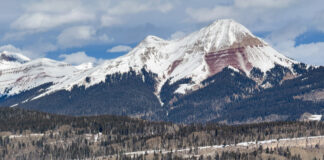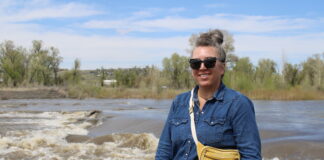
Upper Colorado River Basin water managers have released little information so far about the Colorado proposals submitted for a conservation program, raising concerns about the approval process of the program, which aims to dole out $125 million in federal taxpayer money.
The Colorado Water Conservation Board on March 22 posted on its website the heavily redacted applications for 22 projects that meet the preliminary criteria for approval in a rebooted System Conservation Program (SCP). But in addition to redacting the applicants’ personal identifying information, nearly everything else has been blacked out as well: the location of the projects, such as which streams and ditches are involved; details of the water rights involved; and how much the applicants are asking to be paid for their water. (Here is an example of one of the applications.)
The Colorado River Water Conservation District wrote a memo and discussed the issue at a board meeting Thursday. The state and the Upper Colorado River Commission, which is administering the program, had invited the River District and the public to provide input on the project proposals. But with so little information available, the River District said that is impossible.
“Most, if not all, substantive details are blacked out,” the memo reads. “Thus, it is not possible to provide meaningful analysis of the applications, including whether implementation of the individual proposals would cause injury to other West Slope water users.”
River District General Manager Andy Mueller said his organization, which advocates for water users across 15 Western Slope counties, has concerns about the lack of a public process.
“At this point, that program is not something the district is going to have the capacity to weigh in on in any substantive manner,” he said. “We are proceeding to prepare comments from the district to the UCRC in terms of our concerns about how this process happened… It’s not the way we wish it had been to say the least.”
Becky Mitchell, CWCB executive director and state commissioner to the UCRC, had promised that the River District and Southwestern Water Conservation District would have a say in the approval of project proposals within their boundaries. The River District then developed criteria to evaluate projects, which included who could benefit from program money and preventing too much participation in a single basin. But on March 10, Mitchell walked back her commitment, saying only the UCRC could approve projects, using its own criteria.
The SCP was restarted this year as part of the UCRC’s 5-Point Plan, which is aimed at protecting critical elevations in the nation’s two largest and depleted reservoirs, Lake Powell and Lake Mead. The program will be paid for with $125 million in federal funding from the Inflation Reduction Act and will pay water users in the upper basin states — Colorado, Utah, New Mexico and Wyoming — to cut back. The original SCP, which ran from 2015 to 2018, saved an estimated 47,000 acre-feet of water, at a cost of about $8.6 million. For the renewed program, the UCRC set a baseline price of $150 per acre-foot of water saved, but applicants can ask for more.
Paying water users to irrigate less has long been controversial on the Western Slope, with fears that these temporary and voluntary programs could lead to a permanent “buy and dry” situation that would negatively impact rural farming and ranching communities.

Officials say more information to come
CWCB and UCRC officials say more details of the projects will be made available after they are approved and contracts are in place. The UCRC is set to consider the proposals at an April 10 meeting.
The decision to redact nearly all the information in the applications was a result of a conversation among the UCRC commissioners, said UCRC Executive Director Chuck Cullom.
“There was a discussion, and that’s what the four state commissioners were comfortable sharing at this time,” Cullom said.
According to Amy Ostdiek, CWCB section chief for Interstate, Federal and Water Information, the final implementation agreements and verification plans might look different — after analysis, revisions and back-and-forth with UCRC consultant Wilson Water Group and the applicant — from what was initially proposed. That is part of the reason the information in the proposals is not yet public, she said.
“We, frankly, didn’t want to make a bunch of personal information about our water users or their property, their water rights or how they value them public until we knew we were moving forward with the project,” Ostdiek said. “If they are providing a lot of information that doesn’t get incorporated,… we didn’t want to release that personal information when it wouldn’t be part of a project anyway.”
Ostdiek said the UCRC received more than 80 proposals for projects across the upper basin states. Thirty-six of those were in Colorado, and 22 so far have been given preliminary approval. Those 22 projects (one of which involves land in Wyoming) are estimated to involve 5,800 acres of land and save up to 9,618 acre-feet of water. Most propose halting irrigation for at least part of, if not the entire, season. Ostdiek said the state and division engineers at the Department of Water Resources are reviewing the proposals to make sure projects don’t cause injury to other water users.
Ostdiek said the approval process by the UCRC would be different from that of CWCB, which was narrow and simply designated SCP as a “state-approved conservation program” so that participants could be protected from Colorado’s “use it or lose it” law.
“(The UCRC) will be looking at individual projects,” she said. “It will be a different process than what our board did.”
Both Ostdiek and Cullom said more information will be publicly available after the approval process, but exactly what information that will be is unclear.
“We need to coordinate with the other three upper division states,” Ostdiek said. “We are still kind of working through these issues, but I think it’s fair to say more information will be available once these projects are contracted.”
Aspen Journalism covers water and rivers in collaboration with The Aspen Times.
The Water Desk’s mission is to increase the volume, depth and power of journalism connected to Western water issues. We’re an initiative of the Center for Environmental Journalism at the University of Colorado Boulder. The Water Desk launched in April 2019 with support from the Walton Family Foundation. We maintain a strict editorial firewall between our funders and our journalism.





